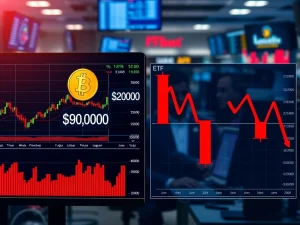Crucial Crypto News Today: Japan’s Yen Stablecoin Breakthrough and Urgent Market Warnings

The cryptocurrency world never stands still. Every day brings fresh, significant developments. For those keen on understanding the evolving digital asset landscape, staying informed is absolutely essential. This comprehensive daily summary provides the crucial Crypto News Today, covering key events impacting Bitcoin, altcoins, DeFi, and global regulation.
Japan’s Pivotal Yen Stablecoin Breakthrough
Japan’s Financial Services Agency (FSA) is preparing to approve the issuance of yen-denominated stablecoins. This marks a significant step for the nation. This approval could occur as early as this fall. It represents the first time Japan will permit a domestic fiat-pegged digital currency.
Tokyo-based fintech firm JPYC will lead this pioneering rollout. The company plans to register as a money transfer business within the month. Japanese news outlet The Nihon Keizai Shimbun reported this development on Sunday. JPYC is specifically designed to maintain a fixed value. One JPYC token will equal one Japanese yen. It will be backed by highly liquid assets. These include bank deposits and Japanese government bonds. After individuals or corporations apply, tokens are issued. They are sent via bank transfer directly to digital wallets.
This approval comes as the global stablecoin market continues its rapid expansion. This market currently exceeds $286 billion. It is largely dominated by dollar-pegged assets. Prominent examples include USDt (USDT) and Circle’s USDC (USDC). While US dollar stablecoins already hold a presence in Japan, this initiative introduces the country’s first yen-based offering. This development could significantly bolster the adoption of the Yen Stablecoin Japan within the local economy and beyond.
Top stablecoins by market cap. Source: CoinMarketCap
Bitcoin Price Outlook: Novogratz’s Stark Warning
Galaxy Digital CEO Mike Novogratz recently shared a sobering perspective. He stated that a million-dollar Bitcoin next year would not signify a victory. Instead, it would indicate severe trouble for the US economy. Novogratz expressed this view during an interview on the Coin Stories podcast. He spoke with Natalie Brunell on Wednesday. He highlighted his preference for economic stability.
“People who cheer for the million-dollar Bitcoin price next year, I was like, Guys, it only gets there if we’re in such a shitty place domestically,” Novogratz explained. He emphasized that a lower Bitcoin price in a more stable United States is preferable. He further elaborated that severe currency devaluations often harm civil society. When a national currency weakens dramatically, investors frequently seek alternative safe havens. They aim to protect their wealth from inflation and instability. Bitcoin is often referred to as digital gold in such scenarios. It serves as a potential hedge against traditional financial system vulnerabilities. This unique perspective offers a critical insight into the broader Bitcoin Price Outlook.
Monero 51% Attack: Kraken’s Swift Response
Kraken, a prominent cryptocurrency exchange, announced a temporary suspension of Monero (XMR) deposits on Friday. This action followed a reported 51% attack on the Monero network. A single mining pool allegedly orchestrated this attack. Qubic, an AI layer-1 blockchain, claimed dominance over the Monero network on Monday. They achieved this by commanding a majority of the network’s hashrate. Hashrate represents the total computing power dedicated to securing a blockchain network.
Kraken swiftly responded to this security threat. The exchange released a statement. “As a security precaution, we have paused Monero deposits after detecting that a single mining pool has gained more than 50% of the network’s total hashing power. This concentration of mining power poses a potential risk to network integrity,” Kraken wrote. The Monero 51% Attack sent shockwaves through the Monero community. It sparked an intense online debate. Discussions focused on network incentives and the long-term security of Proof-of-Work blockchains. This event underscores the constant vigilance required in the crypto space.
Kraken halts Monero deposits. Source: Kraken
Navigating Cryptocurrency Regulation and Market Trends
The events of today highlight the diverse forces shaping the cryptocurrency market. Japan’s move towards a yen stablecoin signals a growing acceptance. Meanwhile, it also indicates a desire for controlled integration of digital assets. This regulatory clarity contrasts with the ongoing debates in other regions. For instance, the US Treasury is reportedly considering digital ID verification in DeFi. This aims to combat illicit finance. Such discussions underscore the global push for more robust Cryptocurrency Regulation.
Regulatory frameworks directly impact market stability. They also influence investor confidence. Clear rules can foster greater adoption. Conversely, uncertainty can deter institutional involvement. The Monero incident, moreover, serves as a stark reminder of security vulnerabilities. These risks exist even within established networks. The continuous evolution of blockchain technology demands adaptive security measures. It also requires responsive regulatory oversight. Understanding these interconnected dynamics is crucial for all participants in the crypto ecosystem.
Conclusion: A Dynamic and Evolving Landscape
Today’s significant developments paint a clear picture. The cryptocurrency landscape remains incredibly dynamic. From Japan’s pioneering stablecoin efforts to critical warnings about Bitcoin’s future and immediate security challenges for altcoins, the pace of change is relentless. Staying informed about these trends is not just beneficial; it is imperative. The digital asset space continues to mature, facing both opportunities and complex challenges daily.









